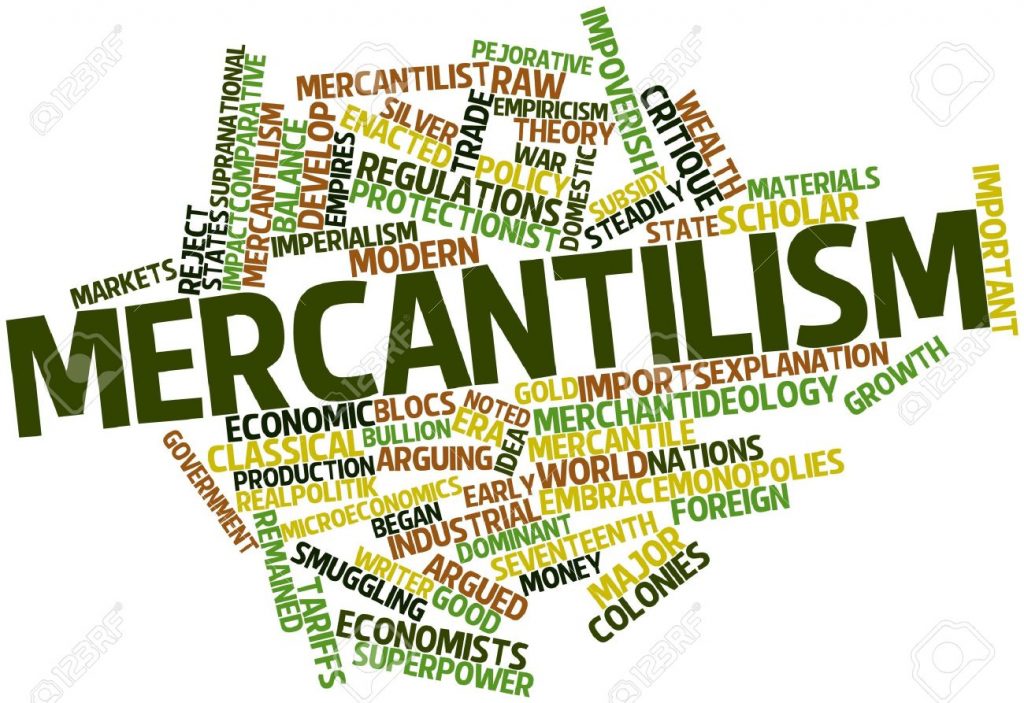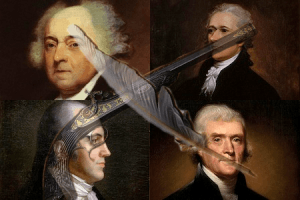Mercantilism is one of the most influential economic doctrines in the history of economics; however, the school that dominated European thought for two centuries is now considered a historical artifact. According to scholar Lars Magnusson, no self-respecting economist would associate himself or herself with mercantilism in today’s society.1

Mercantilism was the dominant economic policy most associated with the Early Modern period of the 16th and 17th centuries. During this era, the only true measure of a country’s wealth and success was thought to be the amount of gold and silver reserves that a nation possessed. In order to add precious metals to a nation’s reserves, it would seek to maximize its net exports and minimize its imports in order to secure its prosperity. Countries that had more wealth could in turn raise and maintain stronger armies and navies, and thus be more powerful. Moreover, according to the doctrine of mercantilism, the gold and silver reserves in the world were thought to be limited. Therefore, one’s gain in precious metals would come at some other country’s expense. Trade was a zero-sum game. For example, the gain from trade for England, mercantilism taught, would be a loss for France or Spain. The best way to ensure a nation’s prosperity was by limiting imports and increasing exports, thereby generating a net inflow of gold and silver, thus increasing the country’s overall gold stocks. Every European nation was trying to find a market for its exports to bring wealth while limiting imports, which would otherwise transfer wealth to others.2
Mercantilism was an economic theory that placed the nation, not the individual, at the center of economic activity. Economic nationalism, the effort to boost exports, was seen as a state-sponsored endeavor. States backed domestic production. Governments applied many forms of protectionist policies in order to promote efficient domestic consumption and maximize the export of surplus production. According to the famous British Navigation Act of 1651, all imports to England had to be carried to English ports on English ships. Colonial exports to Europe had to first land at an English port before going any further. These laws sharply restricted colonial trade with anyone else but England. With mercantilism, each country sought to export as much as possible while preventing imports. As a result, the economic importance of colonies to the success of colonizing powers became vital.3
According to the famous British Navigation Act of 1651, all imports to England had to be carried to English ports on English ships. Colonial exports to Europe had to first land at an English port before going any further. These laws sharply restricted colonial trade with anyone else but England. With mercantilism, each country sought to export as much as possible while preventing imports. As a result, the economic importance of colonies to the success of colonizing powers became vital.3

Colonies played a critical role for European countries. Each country sought to become self-sufficient so that they would not need to import goods from the other European powers. Colonies provided the precious metals and raw materials that European countries needed but could not produce at home. They were also markets for finished goods. According to mercantilism, colonies could only trade with their mother nation, and the direction of wealth should flow to the mother nation. In order to protect colonial trade, each European nation developed powerful navies, which protected its nation’s trade routes.4
The collapse of mercantilist ideology can be attributed to Adam Smith’s classic book The Wealth of Nations. Smith argued that the wealth of a nation does not consist in the amount of gold or silver stashed in its treasuries, but in the productivity of its workforce. He stated that trade can be mutually beneficial for nations, and that the general growth of wealth did not come at the expense of others, but that a “rising tide” of growth would benefit all, which is directly opposed to the ideology of mercantilism.5
- Lars Magnusson, Mercantilism: the shaping of an economic language (London: Routledge, 1994), 8. ↵
- John Maynard Keynes, The general theory of employment, interest and money (New York: Harcourt, Brace and Co., 1936), 3. ↵
- Alan Brinkley, American History: Connecting with the Past Volume 2, 15 edition (New York: McGraw-Hill Education, 2014), 26-27. ↵
- The Concise Encyclopedia of Economics, 2008, s.v. “Mercantilism,” by Laura LaHaye. ↵
- The Concise Encyclopedia of Economics, 2008, s.v. “Mercantilism,” by Laura LaHaye. ↵



85 comments
Joseph Chi
Hey Samuk, I think you wrote a very well written article. You’re right to defend against mercantilism, not all of it is bad, but it’s true that colonies should be focused on helping each other rather than be selfish over minerals. Imagine how much more we could have grown as a species. I also like the cartoon you included that summed up the ways of mercantilism, it made it much more interesting.
Angelo Oliva-Noeggerath
The article about mercantilism tells about it to an understandable level and with the help of the photos, it becomes clear how mercantilism worked. The photo used is about the Mercantilist Argument for Colonial Expansion, it shows how gold and silver were the priority and food and raw materials were inferior to it. Shows the ideal of what mercantilism was truly going for. The article did well to also include how the Wealth of Nations was presented to the reader with the photo and how Adam Smith influenced it. The detail of the article surmised the key points to know about Mercantilism and possibly more.
Seth Roen
It is a fantastic article on a relatively unloved part of history, that being economics, but an essential role, for states cannot exist without it. Mercantilism seems almost like a footnote in history, though the colonies own their existence too. It helped establish the colonies and late capitalism because of how unfair the system was towards the colonies, later the US.
Aaron Onofre
This was a great article to read and it explained mercantilism very well. I find it interesting that now days, we completely disassociate ourselves with mercantilism. It makes me think did the view of the success of the mother country being the most important thing to now the success of the individual to be more important happened immediately. Or did the the ideas of Adam Smith slowly change the people’s view on wealth.
Santiago Sabogal
I think it is interesting how things change through history and I think this is a good example of that. Mercantilism used to be the economic system of the time and everybody thought it worked perfectly and it was never doubted, but if you see it knowdays it is just obsolete. Also, I think the author explained in a detailed way how this economic system worked and, at the same time, did a great job providing examples to make it even clearer (England and the 13 colonies). Finally, I would like to say that I find this article very educational and personally I feel like I know more about mercantilism after reading this article.
Jourdan Carrera
This article does a great job at talking about how mercantilism works in the broad sense of how European nations go about the concept of mercantilism. This article also does a great job at explaining the thought process behind the mercantilist concept and why certain nations such as Great Britain did what they did and why. The article not only explains what mercantilism was and how it was used, but it also discusses how the economic policy died out with the emergence of free trade with nations realizing that it was more beneficial to trade with each other freely.
Ariette Aragon
Very well-written and interesting article! The reading helped me understand mercantilism a lot better, especially the motives behind it and why in the long run it didn’t work. It is interesting to me that this ideology paved the way to modern economic ideologies that exist nowadays in our society. Your detailed writing absorbed me and left me wanting to know more, specifically about Adam Smith’s book “The Wealth of Nations”. It made me think how one man made such revolutionary change of mindset.
Travis Green
Great article, I feel like I finally understand what mercantilism is which is good because I was never that good at understanding it. However I wish you would have went into more detail about how mercantilism fell out of favor because I would like to know what effect Adam Smiths book had. As in did it have an immediate effect or did it make people change their minds over time. Great article regardless.
Tyler Pauly
I enjoyed your in-depth, but yet still concise, description of mercantilism. I think this really helps people understand what the policy was all about and the motives that were behind it. I think it would be very interesting to take a close look at Adam Smith’s influence in ending mercantilism. Did one man really change the whole way the world thought? I also would be curious to who experts claim to be the “winner” from the mercantilism era. As we know now, many of the major players then are much less powerful today.
Edgar Cruz
I find this article quite intriguing because, in certain ways, mercantilism paved a business ideology of today’s modern society. I’d say that overall, the article covers the early ideas and mercantilism in a very adequate form and manner. I thought that the use of the evidence and footnotes were quite proficient. I do wish, however, that this article was a bit longer.